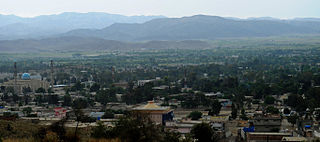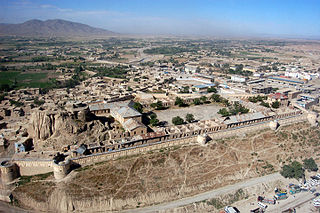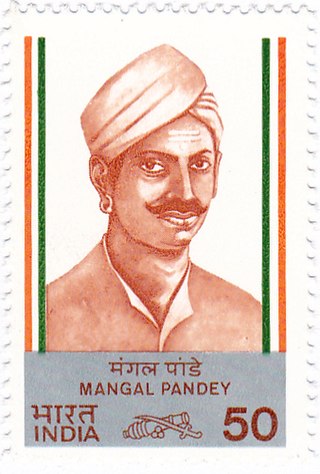
Khōst is the capital of Khost Province in Afghanistan. It is the largest city in the southeastern part of the country, and also the largest in the region of Loya Paktia. To the south and east of Khost lie Waziristan and Kurram in Pakistan. Khost is the home of Shaikh Zayed University. The Khost Airport is located in the eastern area of the city.

Khost is one of the 34 provinces of Afghanistan located in the southeastern part of the country. Khost consists of thirteen districts and the city of Khost serves as the capital of the province. Historically, Khost used to be a part of Paktia and a larger region surrounding Khost is still referred to as Loya Paktia.

Paktia is one of the 34 provinces of Afghanistan, located in the east of the country. Forming part of the larger Loya Paktia region, Paktia Province is divided into 15 districts and has a population of roughly 623,000, which is mostly a tribal society living in rural areas. Pashtuns make up the majority of the population and a small percentage include Tajiks. Gardez is the provincial capital. The traditional food in Paktia is known as (dandakai) which is made from rice and mung bean or green gram.

The Bangash, Bungish, Bangaš or Bangakh are a tribe of Pashtuns, inhabiting their traditional homeland, the Bangash district which stretches from Kohat to Tall in Hangu and Spīn Ghar, Kurram in Khyber Pakhtunkhwa, Pakistan. They also live as a smaller population in Dera Ismail Khel, Bannu while also a smaller population of Bangash inhabit Gardez, Paktia, Afghanistan.

Mangal Pandey: The Rising is a 2005 Indian historical biographical drama film based on the life of Mangal Pandey, an Indian soldier known for helping to spark the Indian Rebellion of 1857.

Mangal Pandey was an Indian soldier who played a key role in the events taking place just before the outbreak of the Indian rebellion of 1857. He was a sepoy (infantryman) in the 34th Bengal Native Infantry (BNI) regiment of the British East India Company. In 1984, the Indian government issued a postage stamp to remember him. His life and actions have also been portrayed in several cinematic productions.
Mangal is a given name and a surname. Notable people with the name include:

The Mangal are a tribe of the Pashtun people residing in eastern Paktia and adjacent Khost provinces of Afghanistan, and in the town of Tari Mangal, district Kurram, Pakistan. Their land constitutes the northeastern part of the Loya Paktia region. The Mangals descend from Karlani Pashtun lineage.

Mohammad Gulab Mangal is an Afghan politician. Since October 2016, he has been serving as the senior adviser minister of borders and tribal affairs for the president of the Islamic Republic of Afghanistan. He is also actively involved in the tribal conflict resolutions. On 23 October 2016, he was appointed as the senior adviser for the minister of borders, tribal affairs, and provincial governor of Nangarhar province until he resigned in April 2018. From 22 April 2015 to 23 October 2016, based on the presidential decree, he was appointed as the acting minister of Ministry of Borders and Tribal Affairs. In 2002, he was elected as the Representative of Paktia Province for Emergency Loya Jirga. From 2002 to 2004, he was the Head of Constitution office for the south east region(Paktia, Paktika, Khost and Ghazni provinces and also Head of Constitution Loya Jirga election office for the South East Region. From 2004 to 2006, he served as Governor of Paktika province. From 2006 to 2008, he served as the Governor of Laghman province. From March 2008 to September 2012, he served as provincial governor of Helmand province.
Alikhil,speni oba, malm Jaba, Swat Pakistan

Dand Aw Patan District is located in the northeastern section of Paktia Province in Afghanistan. It has a population of around 30,551 local residents. The district is within the heartland of the Zazi tribe of Pashtuns.

Said Karam is a district in Paktia Province, Afghanistan. The main town in the district is Khandkhel. The district is within the heartland of the Muqbil tribe of Pashtuns. Villages in the Said Karam district are Khandkhel (خڼخیل), Khunderkhel, Goud Qala Mangal, Chino Klalai, Shaiyesta Kalay and Shaikhan Kalay (توتاخېل)

Lōya Paktiā is a historical and cultural region of Afghanistan, comprising the modern Afghan provinces of Khost, Paktia, and Paktika, as well as parts of Logar and compromises. Loya Paktia is vaguely defined by a common culture and history that is connected to the local indigenous tribes that reside in the region. Particular styles of clothing, articles of clothing, turban styles, turban cloth colors, dialects of Pashto language, etc. may sometimes be associated with specific tribes indigenous to Loya Paktia and thus integrate themselves into regional culture. For instance, a Pashtun tribesman from Loy Kandahar may quickly recognize a Pashtun from Loya Paktia based upon his turban style and color. Likewise, a Pashtun from Loya Paktia may recognize someone from Loy Kandahar based upon his unique style of collarless kameez (shirt) with specific embroidered patterns on the front. There are many subtle and intricate cultural indicators of this type that are not recorded in any known written history but simply known and observed by the tribesmen of the various Pashtun regions of Afghanistan and Pakistan.
The Muqbil is a Pashtun tribe, cousins of the Zadrans and Mangals. They mostly reside in Said Karam District, Paktia Province and also can be found in large numbers in Kurram living beside the Bangash and Mangal Pashtuns. They can be further divided into five clans: Musakhel, Sultak, Ahmadkhel, Hasankhel, and Bobaki.
Chamkani, Tsamkani, or Samkani may refer to:

Janikhel is a district in Paktia Province, Afghanistan. It is on the border with Khost Province, and is mostly inhabited by the Mangal tribes of Pashtuns.
Lazha Mangal or Lija proch Mangal is a district of Paktia Province, Afghanistan. The estimated population in 2019 was 20,891. The district is within the heartland of the Mangal tribe of Pashtuns.
Gulakai Kot (ګوړاکای کلى یا شیرکل کوټ) is a remote village in Afghanistan. It is located at the district of Shwak, in the eastern province of Paktia. It belongs to Shabak Khel tribe, one of the five major Zadran tribes.

Tari Mangal is a town in the Kurram Valley at the Durand Line, near Spin Ghar, in Khyber Pakhtunkhwa in Pakistan. Tari Mangal is 23 kilometres (14 mi) away from Parachinar, and 10 kilometres (6.2 mi) from the town of Aryob in Zazi District, Afghanistan. The Pashtun tribe Mangal has been living in Tari Mangal since 1600 AD. From 1977–1988, during the Soviet–Afghan War, the city served as a Mujahideen camp. Weapons and funds from the United States, en route to Pakistan, were delivered to Afghanistan through the border at Tari Mangal, as well as its neighbouring region Torkham. Due to Tari Mangal's normal weather in summer, many people from hot areas in Pakistan visit Tari Mangal to enjoy cold weather.










